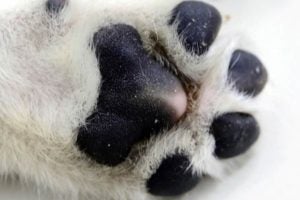 When you breed, keep a close eye on the puppies for unexpected issues that may need intervention and professional help. I had never had more than four puppies in a litter in my many years of breeding Japanese Chin, and then there was a litter of five. The dam had a C-section when she stopped having contractions and two puppy sacks had been expelled, but no puppy.
When you breed, keep a close eye on the puppies for unexpected issues that may need intervention and professional help. I had never had more than four puppies in a litter in my many years of breeding Japanese Chin, and then there was a litter of five. The dam had a C-section when she stopped having contractions and two puppy sacks had been expelled, but no puppy.
As a first-time mom, she struggled to understand that these little “suckerfish” on her belly belonged to her and were her responsibility. It was a challenge for both of us to help her understand that it was my job to take care of her needs, and her job to take care of their needs.
With hourly attention, she went from snapping at the puppies to allowing them to nurse, and finally, with full conviction, she began mothering them to the utmost.
All went along well, with one exception. In my previous life I had the luxury of staying home and keeping a constant watchful eye on a litter’s progress. This litter, however, would not have that luxury. I managed to get five days at home just after the pups were born, but I own a business and have to travel an hour each way, getting up early and coming home late four to six days a week.
My business is a grooming spa, with room in the back for mom and babes to have a large, safe area. Employees were forbidden to enter, and a “sanitation station” was set up outside so all germs could be left behind. I took every precaution to ensure the comfort, safety, and health of these precious little lives.
Best-laid plans do often go awry, however, and so it was for the litter of five. Four weeks after they were born, all was going well until one of them stopped nursing and all seemed to have developed running noses. The vet confirmed they had an upper respiratory infection and would need medication for the typical seven to 10 days.
I had no trouble administering the meds on the prescribed schedule. The pups resisted, but I insisted.
Shortly after they began treatment, I noticed they all slept with their eyes open and that one pup’s eye appeared to be getting cloudy. I rushed them all to a veterinary eye specialist and discovered they had dry eye, and that this was a side effect of the upper-respiratory infection. My vet gave me a supply of drops for all.
I got them a humidifier for their room, and that helped with the breathing. I finger-fed the two who were struggling the most, and once they tasted food off my finger they would eat out of the dish. After about a week of being on medication, the two began nursing again and eating well.
Amazing to me were the side effects of the infection and the need to be prepared for any and all possibilities when taking responsibility for these precious babies.
—Michele C. Blake, Japanese Chin Club of America.


